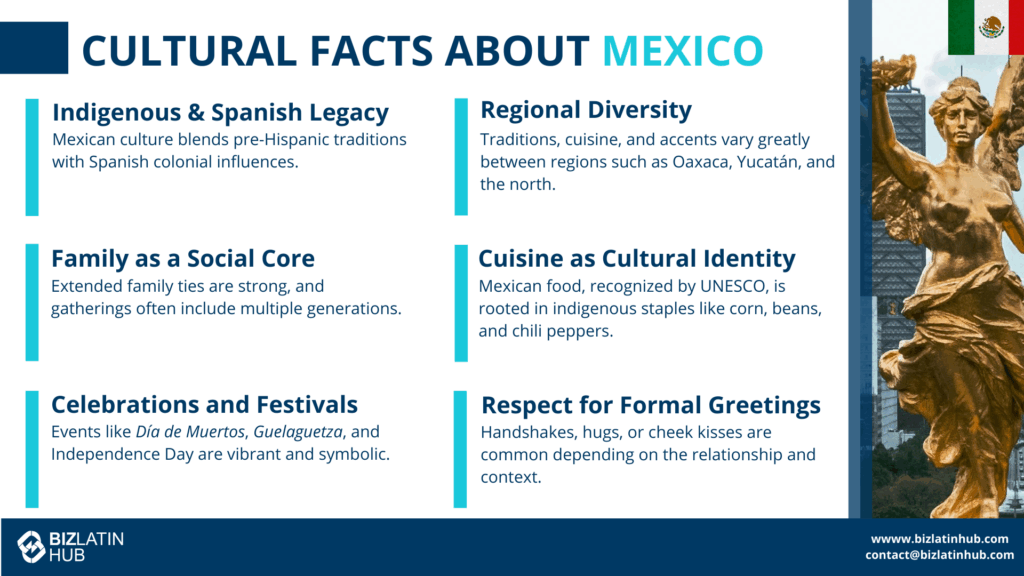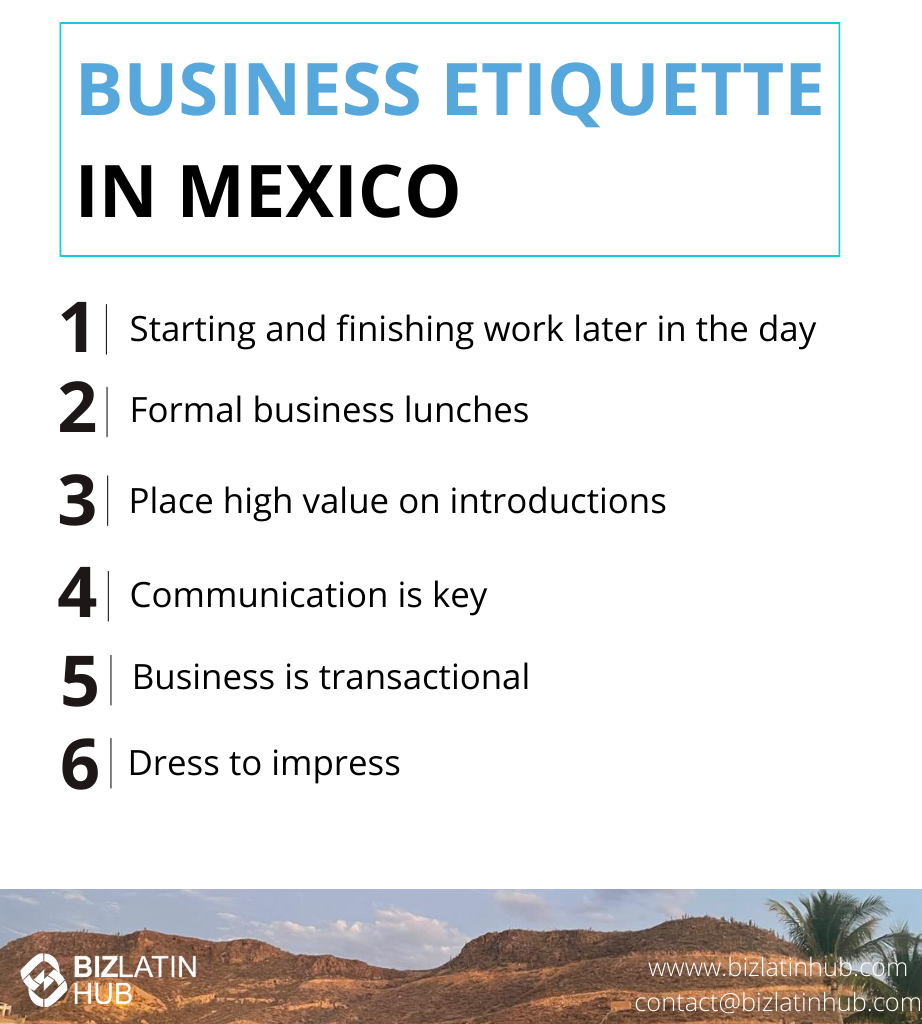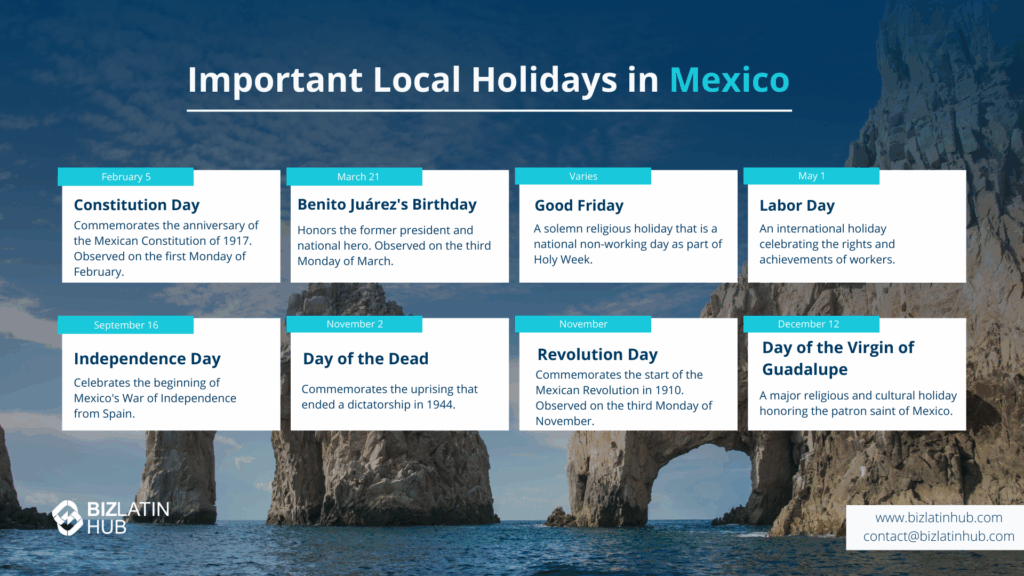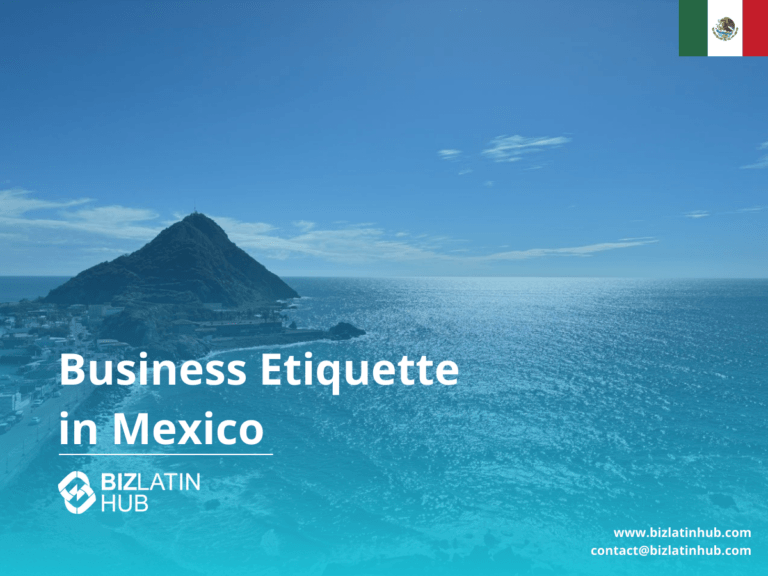Understanding the expectations of local companies is critical after company formation in Mexico. With its impressive growth and economic potential, many foreign companies are choosing to expand into Mexico, but many find the local business culture more formal than they are used to, especially with lunches and dinners. Understanding and respecting the nuances of business etiquette in Mexico can pave the way to successful ventures and fruitful partnerships in this dynamic market with a GDP of USD$1.466 trillion.
With extensive operations across Mexico, Biz Latin Hub shares practical insight into navigating local business expectations for international companies.
Key takeaways on business etiquette in Mexico
| How important is it to build relationships in Mexico? | A great deal of importance is placed on building personal relationships and knowing who you are doing business with. |
| Is punctuality important? | Ignore the stereotypes and make sure you do things on time to make a good impression. |
| What style of negotiation is common? | Be prepared to negotiate and business etiquette in Mexico requires patience when doing so. |
| Do you need to speak Spanish? | Clear communication in English and Spanish will help both with business matters and with building those personal relationships. |
Business etiquette in Mexico: local and international influence
Due to this heavy influence from and engagement with its North American counterparts, Mexico has quickly adapted and aligned its business etiquette and practices with the US and Canada.
However, there are still some locally-influenced attitudes that you will need to keep in mind.
- Starting and finishing work later in the day.
- Formal business lunches.
- Place high value on introductions.
- Communication is key.
- Business is transactional.
- Dress to impress.
1. Starting and finishing work later in the day
In Mexico, it is not uncommon for businesses to start their daily operations around 9-9:30am, which could be regarded as late for some people. However, businesses in Mexico usually will remain open until 7pm or later, with long lunch breaks factored into the daily operations.
Due to these later morning starts, it’s important to avoid calling your Mexican client earlier than 8:30am. If it’s urgent, general business etiquette in Mexico dictates that email communication is best in the early hours. It is important to avoid scheduling a business appointment on Mondays or Fridays, if you are looking to conduct business with that company. These days are strictly off-limits to arrange business meetings in Mexico.
Be sensitive to different time schedules. Organizing meetings when your local business partners and clients most expect them shows a willingness to acknowledge business etiquette in Mexico, and work within familiar parameters. You’ll likely receive a greater response from your prospective partners and clients as a result.
Punctuality is encouraged, especially in northern Mexico and with international companies. However, it’s common for local meetings to begin 10–15 minutes late. Always confirm meetings the day before. Be patient if delays occur. Flexibility is often seen as a virtue, not a lack of professionalism.
2. Formal business lunches
In Mexico, formal business lunches play an instrumental role in conducting business. Lunches often take place mid-afternoon, in a fine dining restaurant and can last for a few hours. Firstly, it is important that you establish with the client that you will be discussing business at this meeting. Choose a formal, trendy restaurant, as your choice may be scrutinized, and will be seen by your client as a sign that you are serious about doing business.
Business lunches often take place on the second or third interaction with the client. Your first meeting should be held in your office. Be prepared to cover the bill and avoid ordering alcoholic beverages, unless the client does. Lunch is the most common setting for business discussions. Expect meetings to take place in restaurants, with meals lasting 1–2 hours. Business might not be addressed until the latter part of the meal. If invited to a dinner or a colleague’s home, bring a small gift like wine or chocolates.
Meeting decision-makers is vital to proper business etiquette in Mexico. Make sure to meet with the senior executives of the company, as they will ultimately be the ones making the call on whether or not partner with you. A high local regard for acknowledging rank in business also means that your senior executives must attend the meeting.
Keep business dinner meetings to a minimum, or avoid them altogether, until you have established a stronger relationship with clients and partners. It’s important to give a professional first impression with clients.

3. Place high value on introductions
Like every other country, Mexico regards face-to-face introductions as a very important aspect of the negotiation process and can be a deal-breaker if not done correctly. A firm handshake is standard for business meetings. In more familiar settings, especially between men and women or among women, a single cheek kiss is customary. This can vary regionally: for example in Mexico City, a handshake is expected at first contact, but in Guadalajara or Monterrey, a cheek kiss might be offered even in semi-formal interactions.
While business cards are becoming less common in the Western world, they are still an important part of proper business etiquette in Mexico. When first meeting your client, be sure to have a business card on hand with you and ready to present whilst introducing yourself, along with a firm handshake. This shows to the client that you are well prepared and illustrates your eagerness to conduct business.
Being prepared in these initial phases is important. Avoid writing your contact details down by hand. Many clients will take a lack of formal contact information as a sign of disrespect and/or disorganization.
4. Communication is key
In Mexico, it is important to be specific with time when organizing meetings with your client. This can be loosely interpreted, and the client may show up late to the meeting.
Therefore, it is important to give an exact time to meet and be sure to arrive at least five minutes prior to the start of the meeting. Always call or email on the first few interactions with your new client. Once you’ve achieved a level of comfort in communicating with your client, then WhatsApp becomes a commonly accepted communication tool for both texting or calling.
Like elsewhere in the world, a face-to-face interaction should never be undervalued and is still a very important element of business etiquette in Mexico. All in all, Mexicans are generally very polite and hospitable people, and it goes without saying that reciprocating this politeness is key.
Mexicans often communicate indirectly, particularly when delivering criticism. A ‘yes’ may mean ‘possibly’ depending on tone. For example, a phrase like ‘déjame pensarlo’ (let me think about it) could suggest hesitation or polite refusal. High-context communication is the norm—body language, tone, and phrasing all carry meaning.

5. Business is transactional
Business etiquette in Mexico is largely transactional, and doing favors for one another – at least during the early stages of business – is not common.
Many clients and commercial actors in Mexico will not expect to give or receive favors, as this can be seen as dishonest or insincere. Be transparent and clear about the services or compensation you’re providing, and stick to it.
Mexican business culture values hierarchy. Decision-making is often centralized with senior executives. Addressing the top decision-maker with respect is critical. Younger or junior staff may not offer opinions unless prompted. Be mindful of status and rank.
6. Dress to impress
In recent years, there has been a small shift in the Western world with regards to dress attire, with most companies now allowing ‘smart business’ attire as an acceptable dress code for employees.
Mexico still holds a conservative approach however, especially in the financial cities such as Mexico City, Guadalajara, Puebla and Monterrey. Formal attire is a symbol of respect. In cities like Mexico City and Monterrey, dark business suits are the standard for men. Women should wear smart, elegant dresses or tailored pantsuits. For men, be sure to wear a suit with tie and blazer and for women, business suits and skirts are accepted.
Companies and clients in tropical climates such as Puerto Vallarta, Veracruz and Cancun will allow for smart casual attire. In coastal or hotter regions, lighter colors and fabrics are acceptable, but formality remains important. Mexicans place a high value on appearance, as looking presentable contributes to a greater perception of professionalism. Disregarding your physical presentation could lead to an unsuccessful negotiation.

FAQs on business etiquette in Mexico
These are some of the most common questions we receive from international investors interested in business etiquette in Mexico.
1. Can a foreigner own a business in Mexico?
Yes, by either legal persons (legal entities) or natural persons (individuals).
2. Why do business in Mexico?
Mexico is on the way to becoming a top-ten economy in the world within the next decade. Over recent years, Mexico has become an increasingly low-risk, high-growth economy. It has consistent GDP growth, its middle class continues to expand, and the security situation is improving.
3. What is the appropriate greeting in Mexican business settings?
A firm handshake is the standard greeting. In familiar settings, especially among women or between men and women, a cheek kiss is also common. Always start formal and allow your counterpart to set the tone.
4. Is punctuality strict in Mexican business culture?
While punctuality is expected—especially from foreign professionals—local meetings may start late. Arrive on time, confirm appointments in advance, and remain flexible if delays happen.
5. How should I dress for business meetings in Mexico?
Dress conservatively and formally. In Mexico City, dark suits and ties are standard. Women should wear smart professional clothing. In warmer cities, lighter fabrics are acceptable but should still look polished.
6. Are business conversations direct in Mexico?
No. Communication tends to be indirect. Disagreement or negative responses are often softened. It’s important to interpret tone and body language to understand the true meaning of a response.
7. Is hierarchy important in Mexican businesses?
Yes. Companies are generally structured top-down, and decisions rest with senior executives. Show deference to authority, and avoid challenging hierarchy in group settings.
8. What role do business meals play in relationship building?
Business meals, especially lunch, are an important part of relationship-building. These settings are more relaxed and are often where trust is developed before formal agreements are made.
Having a comprehensive understanding of how business etiquette in Mexico functions can help you to form and grow a successful company. In some cases, it can be the difference between securing new clients and losing potential leads when doing business in Mexico.
It’s not always easy to navigate new markets, especially in the social realms of business and personal etiquette. When entering a new market, make sure you partner with a local expert who can bridge the commercial and cultural gaps in Mexico to give your business the best possible start.
At Biz Latin Hub, our local and expatriate experts in the Mexico team can guide your business through company formation and other market entry process, and support your expansions with in-depth knowledge at local business etiquette.
Contact us to find out more about how we can support you.
Learn more about our team and expert authors. Check out our short presentation below for more tips on doing business in Mexico.






